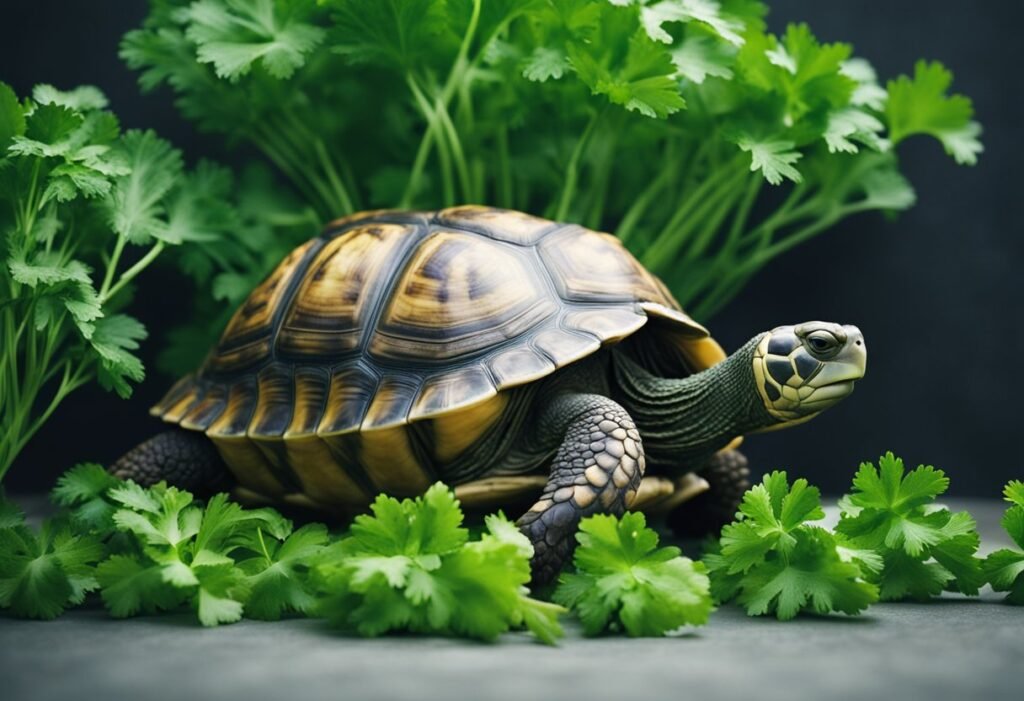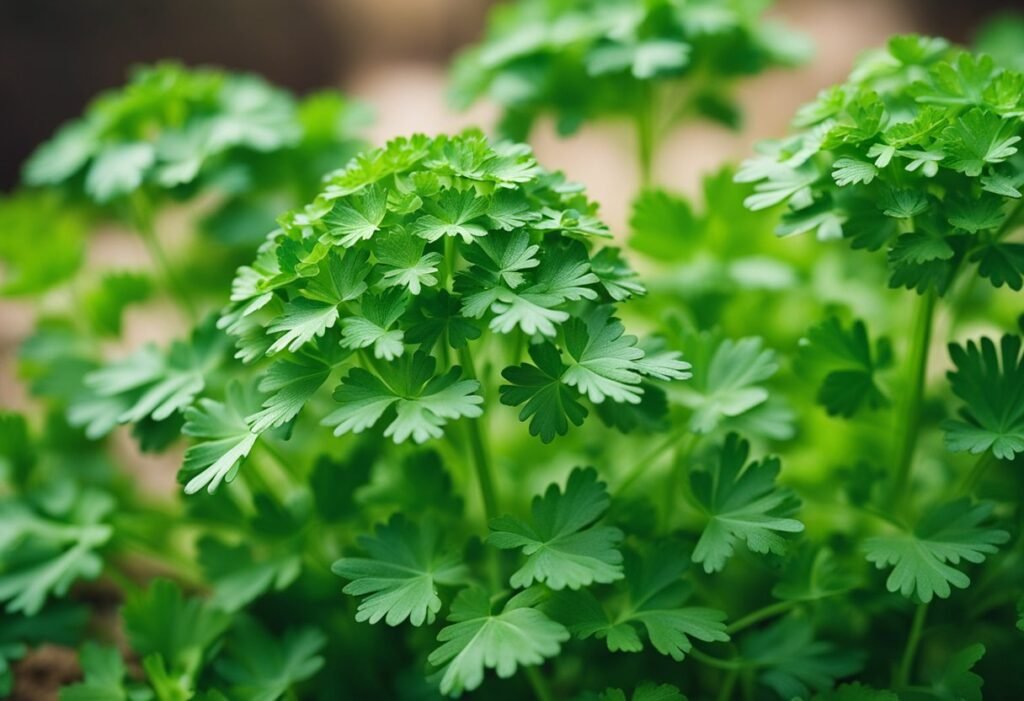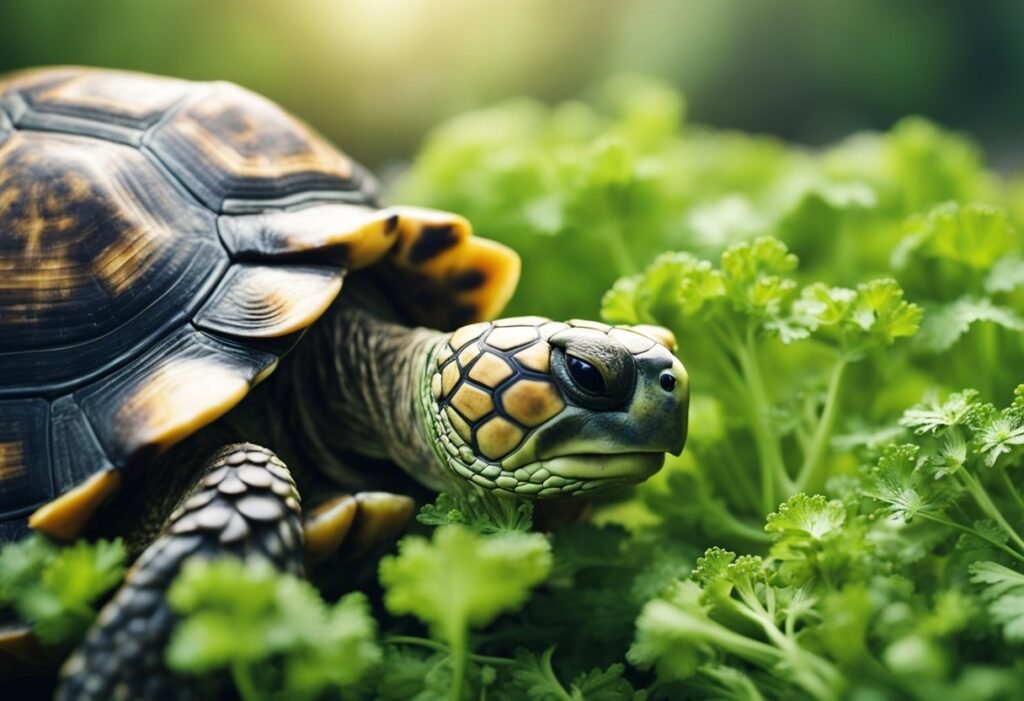Tortoises are herbivores, and they require a diet rich in fiber and nutrients to maintain their health. While there are several vegetables and fruits that are safe for tortoises to eat, it’s important to know which foods are toxic to them. One such food that many tortoise owners wonder about is parsley.
Parsley is a popular herb that’s used in many dishes as a garnish or seasoning. It’s a good source of vitamins and minerals for humans, but can tortoises eat parsley? The answer is yes, in moderation. Parsley is safe for tortoises to eat, but it should not be a staple in their diet. It’s best to offer it as an occasional treat alongside other vegetables and fruits.
It’s important to note that while parsley is safe for tortoises to eat, some other herbs and plants can be toxic to them. Before introducing any new food to your tortoise’s diet, it’s best to do your research and make sure it’s safe for them to consume. By providing a balanced diet and avoiding toxic foods, you can help ensure your tortoise stays healthy and happy.
Table of Contents
Can Tortoises Eat Parsley: The Fundamentals

Parsley is a popular herb that is often used in various dishes, but can tortoises eat it? In this section, we will discuss the fundamentals of feeding parsley to tortoises.
Firstly, it is important to note that parsley is safe for tortoises to eat in moderation. However, it should not be the main source of their diet. Tortoises require a balanced diet that consists of various vegetables, fruits, and occasionally protein.
When feeding parsley to tortoises, it is important to ensure that it is fresh and free from any pesticides or chemicals. It is also recommended to chop the parsley into small pieces to make it easier for the tortoise to eat.
It is important to note that parsley contains oxalates, which can bind to calcium and prevent its absorption. This can lead to calcium deficiency in tortoises, which can result in health issues such as metabolic bone disease. Therefore, it is important to feed parsley in moderation and not as a staple part of their diet.
In summary, tortoises can eat parsley but it should be fed in moderation and as part of a balanced diet. Fresh, pesticide-free parsley should be chopped into small pieces before feeding to tortoises. It is also important to be aware of the oxalates in parsley and not to feed it as a staple part of their diet.
Nutritional Benefits of Parsley for Tortoises

Parsley is a herb that is commonly used in cooking and as a garnish. It is also a great source of nutrition for tortoises. Here are some of the nutritional benefits of parsley for tortoises:
High in Vitamins
Parsley is a great source of vitamins A, C, and K. Vitamin A is essential for healthy skin and eyesight, while vitamin C is important for a healthy immune system. Vitamin K is necessary for proper blood clotting.
Rich in Minerals
Parsley is also rich in minerals such as calcium, iron, and potassium. Calcium is essential for strong bones and shell growth in tortoises, while iron is important for healthy blood cells. Potassium helps to regulate blood pressure and maintain proper hydration levels.
Low in Oxalates
Unlike some other leafy greens, parsley is low in oxalates. Oxalates can bind to calcium and prevent its absorption, which can lead to health problems in tortoises. Parsley is a safe and healthy addition to a tortoise’s diet.
How to Feed Parsley to Your Tortoise
When feeding parsley to your tortoise, make sure to wash it thoroughly to remove any dirt or pesticides. Chop it into small pieces and mix it in with your tortoise’s regular diet of leafy greens and vegetables. Remember to feed parsley in moderation, as too much can cause digestive issues.
In conclusion, parsley is a great source of nutrition for tortoises. It is high in vitamins, rich in minerals, and low in oxalates. Adding parsley to your tortoise’s diet can help promote overall health and well-being.
Potential Risks of Feeding Parsley to Tortoises

When it comes to feeding tortoises, it’s important to consider the potential risks of certain foods. While parsley is generally considered safe for tortoises to eat in moderation, there are a few risks to keep in mind.
Firstly, parsley contains a compound called oxalic acid, which can bind to calcium and prevent its absorption in the body. This can lead to calcium deficiency, which is a serious health concern for tortoises. While parsley is not particularly high in oxalic acid compared to some other foods, it’s still important to limit the amount of parsley your tortoise eats.
Secondly, parsley is a diuretic, which means it can increase urine production and lead to dehydration if your tortoise doesn’t have access to plenty of fresh water. This is especially important to keep in mind if you live in a hot or dry climate.
Finally, some tortoises may be allergic to parsley or other plants in the parsley family, such as cilantro or dill. If you notice any signs of an allergic reaction, such as swelling, itching, or difficulty breathing, stop feeding parsley immediately and consult a veterinarian.
Overall, while parsley can be a healthy addition to your tortoise’s diet in moderation, it’s important to be aware of these potential risks and to feed a varied diet that includes a variety of other safe foods as well.
How to Feed Parsley to Tortoises
When feeding parsley to tortoises, it’s important to ensure that it’s done in moderation. Parsley is a great source of vitamins and minerals, but too much can be harmful to your tortoise’s health. Here are some tips on how to feed parsley to your tortoise:
- Start with small amounts: Begin by offering your tortoise a small amount of parsley, about the size of a quarter, and observe how they react. If they eat it without any problems, you can gradually increase the amount.
- Wash thoroughly: Make sure to wash the parsley thoroughly before feeding it to your tortoise. This will help remove any dirt or pesticides that may be present.
- Offer fresh parsley: Always offer fresh parsley to your tortoise. Avoid feeding them wilted or spoiled parsley, as it can make them sick.
- Chop into small pieces: Chop the parsley into small pieces to make it easier for your tortoise to eat. This will also help prevent choking.
- Offer as a treat: Parsley should be offered as a treat, not as a staple food. It’s important to provide your tortoise with a variety of foods to ensure they receive all the necessary nutrients.
In summary, parsley can be a healthy addition to your tortoise’s diet when fed in moderation. Always wash the parsley thoroughly, offer it fresh, chop it into small pieces, and offer it as a treat.
Alternatives to Parsley in Tortoise Diet
While parsley is a nutritious addition to a tortoise’s diet, it may not be readily available or affordable for some pet owners. Fortunately, there are several other greens that can be fed to tortoises to ensure they receive a well-balanced diet.
Here are some alternatives to parsley that can be included in a tortoise’s diet:
- Dandelion Greens: These are a great source of calcium and vitamin A. Tortoises usually enjoy eating them, and they are easy to find in most yards or gardens.
- Collard Greens: These are another excellent source of calcium and vitamin A. They are also high in fiber, which can help keep a tortoise’s digestive system healthy.
- Turnip Greens: These are a good source of vitamin A, calcium, and phosphorus. They are also low in oxalates, which can be harmful to tortoises in large quantities.
- Mustard Greens: These are high in vitamin A and calcium, and they have a slightly spicy flavor that some tortoises enjoy.
- Kale: This leafy green is a good source of calcium and vitamin A, but it should be fed in moderation due to its high oxalate content.
It’s important to note that while these greens are healthy for tortoises, they should still be fed in moderation and as part of a varied diet. We recommend rotating different greens and vegetables to ensure your tortoise receives all the necessary nutrients.
Understanding Tortoise Dietary Needs
When it comes to feeding tortoises, it’s important to understand their dietary needs. Tortoises are herbivores, meaning they primarily eat plant-based foods. However, not all plants are safe for tortoises to eat.
Tortoises require a diet that is high in fiber and low in protein. They also need a variety of different types of plants to ensure they are getting all the necessary nutrients. Some good options include leafy greens like kale, collard greens, and dandelion greens, as well as vegetables like carrots, squash, and sweet potatoes.
While parsley is safe for tortoises to eat in small amounts, it should not be a staple of their diet. This is because parsley is high in calcium and oxalates, which can be harmful to tortoises if consumed in large quantities.
It’s important to remember that tortoises have different dietary needs depending on their species, age, and overall health. It’s always best to consult with a veterinarian or a reptile specialist to determine the best diet for your specific tortoise.
Frequently Asked Questions

What herbs can a tortoise safely consume?
Tortoises can safely consume a variety of herbs, including parsley, basil, and oregano. However, it’s important to note that herbs should not make up the majority of a tortoise’s diet, and should only be given in moderation.
What are some safe plants for a tortoise’s diet?
Tortoises can safely consume a variety of plants, including dandelion greens, collard greens, and kale. It’s important to ensure that the plants are pesticide-free and thoroughly washed before feeding them to your tortoise.
What vegetables should be included in a tortoise’s diet?
Tortoises should have a diet that includes a variety of vegetables, such as carrots, squash, and bell peppers. It’s important to avoid feeding them vegetables that are high in oxalic acid, such as spinach and rhubarb.
Can tortoises eat chives or other alliums?
No, tortoises should not eat chives or other alliums such as onions or garlic. These plants can be toxic to tortoises and should be avoided.
What fruits are safe for tortoises to eat?
Tortoises can safely consume a variety of fruits, including apples, bananas, and strawberries. However, fruits should only make up a small part of a tortoise’s diet, and should be given in moderation.
Are there any greens that tortoises should avoid eating?
Yes, there are some greens that tortoises should avoid eating. Greens that are high in oxalic acid, such as spinach and rhubarb, should be avoided. Additionally, iceberg lettuce should be avoided as it has little nutritional value and can cause digestive issues.





